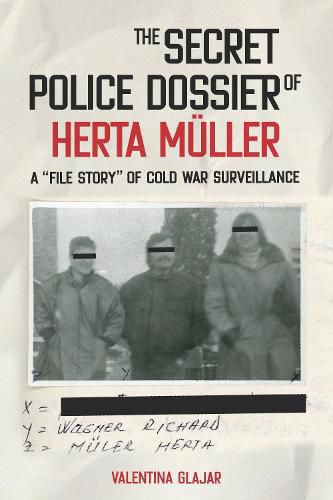Readings Newsletter
Become a Readings Member to make your shopping experience even easier.
Sign in or sign up for free!
You’re not far away from qualifying for FREE standard shipping within Australia
You’ve qualified for FREE standard shipping within Australia
The cart is loading…






Herta Muller should share her Nobel with the Securitate. This comment by a former officer in the Romanian secret police, or Securitate, was in reaction to hearing that Muller, a German writer originally from Romania, had won the 2009 Nobel Prize for Literature. Communist Romania’s infamous secret police was indeed a protagonist in Muller’s work, though an undesired and dreaded one: most of her writings are deeply and explicitly anchored in Ceausescu’s Romania and her own traumatic experiences with the Securitate. Muller’s file traces her surveillance from 1983 until after she emigrated to West Germany in 1987. She has written extensively in reaction to reading her file, but primarily addresses its gaps, begging the question what information the file does in fact contain.
This book is an in-depth investigation of Muller’s file, and engages with other related files, including that of her then-husband, the writer Richard Wagner. Valentina Glajar treats the files as primary sources in order to re-create the story of Muller’s surveillance by the Securitate. In such an intrusive culture of surveillance, surviving the system often meant a certain degree of entanglement: for victims, collaborators, and implicated subjects alike. Veiled in secrecy for decades, these compelling and complex documents shed light on a boundary between victims and perpetrators as porous as the Iron Curtain itself.
$9.00 standard shipping within Australia
FREE standard shipping within Australia for orders over $100.00
Express & International shipping calculated at checkout
Herta Muller should share her Nobel with the Securitate. This comment by a former officer in the Romanian secret police, or Securitate, was in reaction to hearing that Muller, a German writer originally from Romania, had won the 2009 Nobel Prize for Literature. Communist Romania’s infamous secret police was indeed a protagonist in Muller’s work, though an undesired and dreaded one: most of her writings are deeply and explicitly anchored in Ceausescu’s Romania and her own traumatic experiences with the Securitate. Muller’s file traces her surveillance from 1983 until after she emigrated to West Germany in 1987. She has written extensively in reaction to reading her file, but primarily addresses its gaps, begging the question what information the file does in fact contain.
This book is an in-depth investigation of Muller’s file, and engages with other related files, including that of her then-husband, the writer Richard Wagner. Valentina Glajar treats the files as primary sources in order to re-create the story of Muller’s surveillance by the Securitate. In such an intrusive culture of surveillance, surviving the system often meant a certain degree of entanglement: for victims, collaborators, and implicated subjects alike. Veiled in secrecy for decades, these compelling and complex documents shed light on a boundary between victims and perpetrators as porous as the Iron Curtain itself.